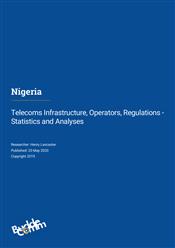Nigeria - Telecoms Infrastructure, Operators, Regulations - Statistics and Analyses

Last updated: 20 May 2020 Update History
Report Status: Archived
Report Pages: 77
Analyst: Henry Lancaster
Synopsis
Nigeria has one of the largest telecom markets in Africa, supported by the second largest economy on the continent after South Africa. The economy has recovered from the recession experienced in 2016, with DGP growth of 1.9% in 2018. The telecom sector attracts considerable foreign investment, particularly from China, and government infrastructure programs will further stimulate investment in coming years. Market liberalisation measures have also led to hundreds of companies, many of them small and localised, being set up to provide a range of telecom and value-added services.
The mobile sector has benefited from market competition and the wider deployment of LTE technologies, which have in turn supported operator revenue growth and encouraged the adoption of mobile broadband among subscribers. Other than the key mobile network operators, there are a number of additional players operating under a unified licensing regime.
The regulator has licensed a number of regional infrastructure companies (InfraCos) to build the national broadband network and offer capacity to all service providers on a non-discriminatory, open-access and price-regulated basis.
Nigeria has the most competitive fixed-line market in Africa, featuring a second national operator (Globacom) and over 80 other companies licensed to provide fixed-telephony services. The alternative carriers combined provide around 85% of all fixed connections, though in general terms about 80% of all connections are wireless.
Several microwave and fibre-based national backbone networks are being rolled out by various companies. Nitel’s monopoly on international fibre bandwidth via the SAT-3/WASC submarine cable system ended in 2009 when Globacom’s Glo-1 cable landed in the country. The landing of additional submarine cables (supported by improved domestic fibre infrastructure) has delivered a further boost to the country’s developing broadband sector by improving bandwidth and reducing prices for end-users. Globacom is building a second cable, Glo-2, to reinforce its infrastructure in the south of the country.
Key developments:
- Globacom commissions the Glo-2 cable system;
- Government approves $328 million loan to complete national backbone project;
- Regulator licences additional InfraCos;
- Government pledges to deploy 18,000km of fibre to extend broadband to rural areas;
- Two additional satellites proposed to provide additional capacity to NigComSat;
- MTN Nigeria secures licence for spectrum in the 2.6GHz band;
- Efforts continue to promote infrastructure sharing;
- Report update includes the regulator’s market data to June 2019, operator data to Q1 2019, Telecom Maturity Index charts and analyses, recent market developments.
Companies mentioned in this report:
Nigerian Telecommunications (Nitel, Pentascope, Transcorp), Globacom, VGC Communications (MTN), Nepskom Communications, MTS First Wireless, Suburban Telecom, Backbone Connectivity Network (BCN), Traffic Network Services, Fibre Tech West Africa, Phase3 Telecom, Alheri Engineering, Gateway Telecoms Integrated Services, Mobitel Nigeria, Prestel (O-Mobile), Galaxy Backbone, 21st Century Technologies, Main One (Mainstreet Technologies), Brymedia, NigComSat, O3b Networks, WASACE.
Related Reports
- Africa - Fixed Broadband Market - Statistics and Analyses
- Nigeria - Telecoms, Mobile and Broadband - Statistics and Analyses
- 2019 Africa - Mobile Network Operators and MVNOs
- Ethiopia - Telecoms, Mobile and Broadband - Statistics and Analyses
- Morocco - Telecoms, Mobile and Broadband - Statistics and Analyses
- Namibia - Telecoms, Mobile and Broadband - Statistics and Analyses
- Madagascar - Telecoms, Mobile and Broadband - Statistics and Analyses
- Benin - Telecoms, Mobile and Broadband - Statistics and Analyses
- Cameroon - Telecoms, Mobile and Broadband - Statistics and Analyses
- Eritrea - Telecoms, Mobile and Broadband - Statistics and Analyses
Share this Report
TMT Intelligence
A platform to scale your intelligence tasks
Monitor critical insights with our AI-powered Market Intelligence Platform gathering and analyzing intelligence in real time. With AI trained to spot emerging trends and detect new strategic opportunities, our clients use TMT Intelligence to accelerate their growth.
If you want to know more about it, please see:
Research Methodology
BuddeComm's strategic business reports contain a combination of both primary and secondary research statistics, analyses written by our senior analysts supported by a network of experts, industry contacts and researchers from around the world as well as our own scenario forecasts.
For more details, please see:
More than 4,000 customers from 140 countries utilise BuddeComm Research
Are you interested in BuddeComm's Custom Research Service?
Hot Topics
News & Views
Have the latest telecommunications industry news delivered to your inbox by subscribing to BuddeComm's weekly newsletter.